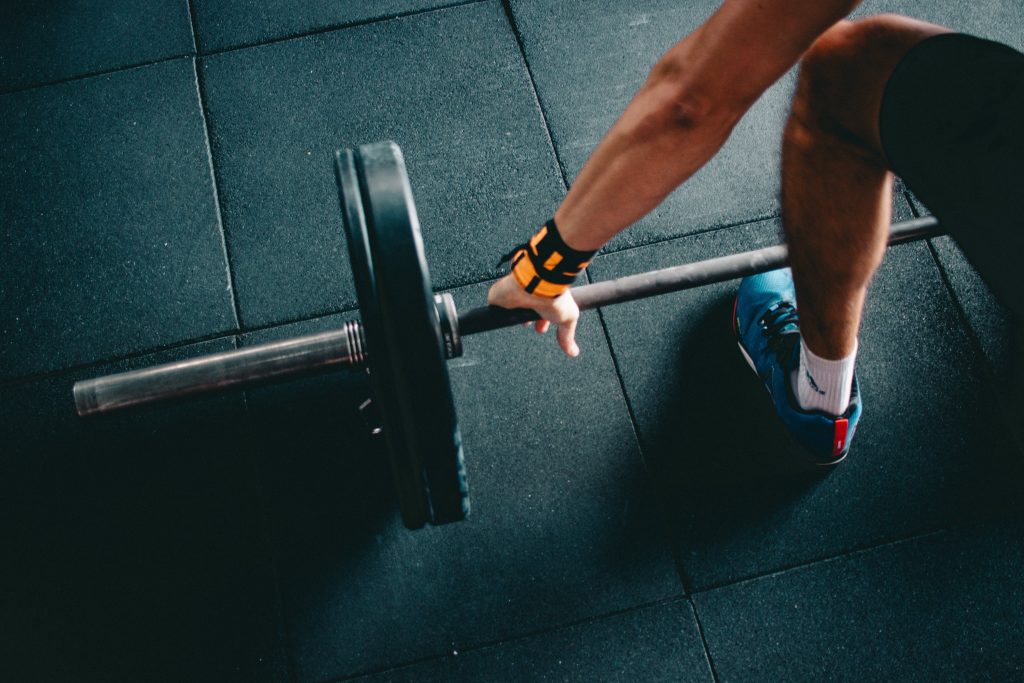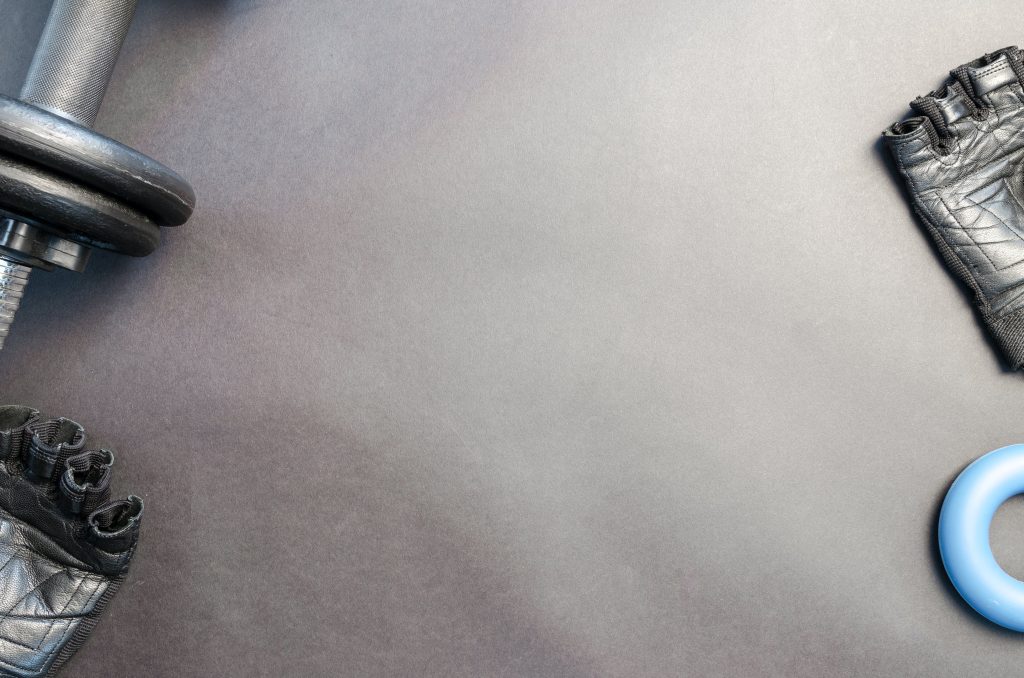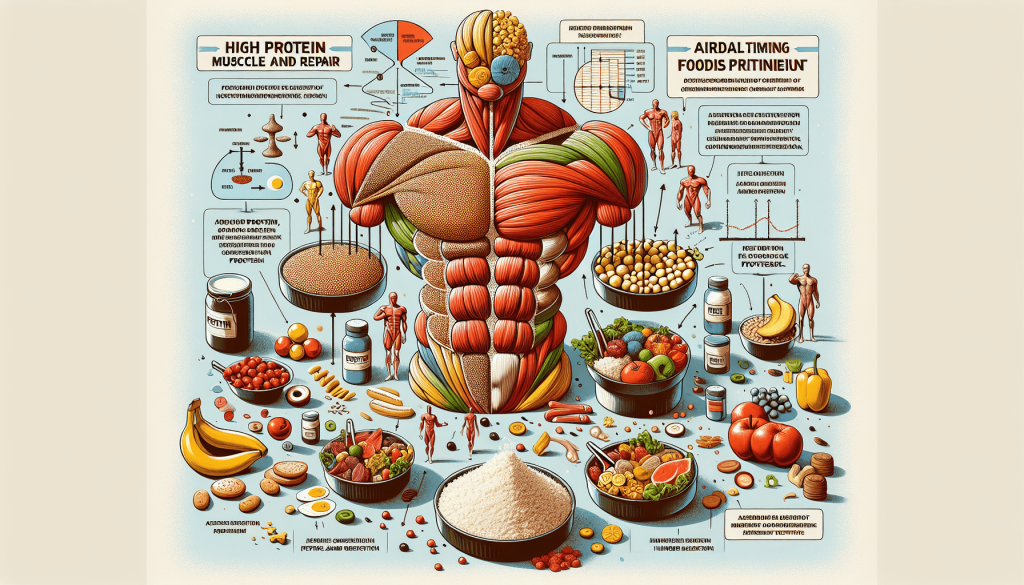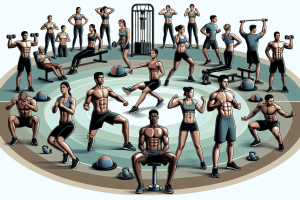If you’ve ever wondered about the secret to developing a six-pack and strong core muscles, the answer may lie in the role of protein. Protein plays a crucial part in the process, fueling muscle growth and repair. Whether you’re hitting the gym or engaging in intense physical activities, protein provides the necessary building blocks to support muscle development and recovery. Understanding the role of protein in this journey is key to achieving the defined abdominal muscles you desire.
The Importance of Protein in Building Six-Pack Abs
When it comes to building six-pack abs, protein plays a crucial role. Not only does protein facilitate muscle growth, but it also aids in muscle recovery, fat loss, and overall body composition. Understanding the importance of protein in your diet can help you achieve those defined abs you’ve been working so hard for.
Protein and Muscle Growth
Protein is essential for muscle growth, as it provides the necessary building blocks for muscle fibers. When you engage in strength training exercises, you create micro-tears in your muscles. Protein helps repair these tears and promotes the growth of new muscle tissue, resulting in increased muscle mass and definition in your abs.
Protein Synthesis
Protein synthesis is the process by which your body creates new proteins. When you consume protein, it is broken down into amino acids, which are then used by your body to build and repair tissues. By ensuring an adequate protein intake, you can optimize protein synthesis and support muscle growth in your quest for six-pack abs.
Protein and Fat Loss
In addition to promoting muscle growth, protein also plays a role in fat loss. Protein has a high thermic effect, meaning it requires more energy to digest and metabolize compared to carbohydrates and fats. This increased energy expenditure boosts your metabolism, helping you burn more calories throughout the day. Additionally, protein helps to preserve lean muscle mass during weight loss, which is vital in maintaining a toned appearance and showcasing those abs.
Protein and Muscle Recovery
Regular intense workouts can lead to muscle damage and fatigue. Adequate protein consumption is crucial for muscle recovery and repair. Protein helps reduce muscle inflammation and speed up the healing process, allowing you to bounce back quicker from your workouts. By prioritizing protein in your diet, you can optimize your muscle recovery and maintain a consistent workout routine to develop those coveted six-pack abs.
Recommended Protein Intake for Six-Pack Development
Determining the appropriate amount of protein for your individual needs is essential for building six-pack abs. Factors such as gender and activity level play a role in determining your protein requirements, but the general recommendation for protein intake for muscle development is around 0.7-1 gram of protein per pound of body weight.
Gender and Protein Needs
Men typically require more protein than women due to their higher levels of lean muscle mass. However, both men and women can benefit from increasing their protein intake to support muscle growth and repair. Women should aim for approximately 0.7-0.9 grams of protein per pound of body weight, while men may need closer to 0.8-1 gram of protein per pound of body weight.
Activity Level and Protein Requirements
If you lead an active lifestyle or engage in regular strength training exercises, your protein requirements may be higher. Increased physical activity and muscle stress require additional protein to support muscle repair and growth. It is recommended to consume extra protein to benefit from the positive effects on muscle development, especially if you are striving to achieve six-pack abs.
Timing of Protein Consumption
In addition to the overall protein intake, the timing of protein consumption can also impact muscle development. Consuming protein before and after your workout is particularly important for maximizing muscle protein synthesis. Aim to have a protein-rich meal or snack within an hour before and after your workout to provide your muscles with the necessary nutrients for optimal growth and recovery.

Best Sources of Protein for Building Six-Pack Abs
Not all sources of protein are created equal. When building six-pack abs, it is essential to choose high-quality protein sources that provide essential amino acids and promote muscle growth.
Lean Meats and Poultry
Lean meats such as chicken, turkey, and lean cuts of beef are excellent sources of protein for muscle development. They are low in fat and rich in essential amino acids, making them ideal choices for building six-pack abs. Opt for skinless poultry and lean cuts of meat to minimize calorie intake without sacrificing protein content.
Fish and Seafood
Fish and seafood are not only rich in protein but also packed with omega-3 fatty acids, which have numerous health benefits. Salmon, tuna, and trout are particularly good options for building muscle and supporting overall health. These protein-rich seafood choices provide a complete package of essential nutrients for your body.
Plant-based Proteins
If you follow a vegetarian or vegan lifestyle, you can still meet your protein needs for building six-pack abs. Plant-based protein sources such as legumes, beans, tofu, and tempeh are excellent options. Quinoa, hemp seeds, and chia seeds are also plant-based protein sources that can contribute to your protein intake.
Dairy Products
Dairy products, such as Greek yogurt, cottage cheese, and milk, are rich in protein and can be a convenient and tasty way to meet your protein needs. Dairy also provides essential nutrients like calcium, which supports overall bone health. However, it is essential to choose low-fat or non-fat options to minimize calorie and saturated fat intake.
Supplement Options
In some cases, it may be challenging to meet your protein needs solely through whole food sources. Protein supplements such as whey protein, casein protein, or plant-based protein powders can provide a convenient and concentrated source of protein. However, it is crucial to use supplements as a complement to a well-rounded diet, rather than relying on them as the primary source of protein.
Balancing Macronutrients for Six-Pack Development
While protein is crucial for building six-pack abs, it is essential to balance it with the right amount of carbohydrates and fats to optimize your results.
Protein, Carbohydrates, and Fats
Protein should be the cornerstone of your diet when aiming for six-pack abs. However, it is equally important to include complex carbohydrates and healthy fats in your meals. Carbohydrates provide energy for your workouts, while fats support hormone production and overall health. Aim for a well-balanced diet that includes around 40% of calories from protein, 40% from carbohydrates, and 20% from healthy fats.
Calorie Intake and Deficit
To reveal your abs, you need to achieve a calorie deficit by consuming fewer calories than you burn. This deficit can come from a combination of reduced calorie intake and increased physical activity. However, it is crucial to maintain a balance, as an excessive calorie deficit can hinder muscle growth and recovery. Aim for a moderate calorie deficit of 300-500 calories per day to support fat loss while preserving muscle mass.
Importance of Nutrient Timing
In addition to balancing macronutrients, the timing of your meals can also impact your six-pack development. Consuming a protein-rich meal or snack before and after your workout can help optimize muscle protein synthesis and aid in recovery. Spread your protein intake evenly throughout the day to ensure a constant supply of amino acids for muscle growth and repair.

Considerations for Vegetarian and Vegan Individuals
Individuals following a vegetarian or vegan lifestyle can still build six-pack abs by carefully choosing their protein sources and ensuring adequate nutrient intake.
Complete Proteins
One consideration for vegetarian and vegan individuals is the concept of complete proteins. Complete proteins contain all nine essential amino acids that your body needs. While most animal-based proteins are complete, some plant-based proteins lack one or more essential amino acids. However, by combining different plant-based proteins such as legumes and grains, you can create complete protein sources.
Combining Plant-based Proteins
To ensure you are getting all the essential amino acids, combine different plant-based protein sources in your meals. For example, pair beans with rice or tofu with quinoa. By combining complementary proteins, you can create complete protein sources that support muscle growth and development.
Supplementing with Protein Powders
For vegetarian or vegan individuals who struggle to meet their protein needs solely through whole food sources, protein powders can be a helpful supplement. Plant-based protein powders, such as pea protein or soy protein, offer a convenient and concentrated source of protein. However, be sure to choose powders that are free from artificial additives and sweeteners.
The Role of Protein in Muscle Recovery and Repair
Intense workouts can lead to muscle damage and take a toll on your body. Protein plays a vital role in muscle recovery and repair.
Micro-tears and Muscle Damage
During resistance training, you create tiny tears in your muscle fibers. These micro-tears are an essential part of the muscle growth process, but they can also cause soreness and inflammation. Adequate protein intake provides the necessary building blocks to repair these tears and promote muscle recovery.
Muscle Protein Breakdown
Intense exercise can also lead to muscle protein breakdown. Consuming protein after your workout helps counteract this breakdown and stimulates muscle protein synthesis, optimizing your muscle growth potential. By prioritizing protein intake after your workouts, you can support muscle recovery and maximize the results of your training.
Protein and Stimulating Repair
Protein provides the essential amino acids needed for repairing damaged muscle tissue. These amino acids act as the building blocks, helping your muscles recover and grow stronger after challenging workouts. By ensuring an adequate protein intake, you can facilitate the repair process and promote optimal muscle recovery.
Timing of Protein Intake
Consuming protein within an hour before and after your workout is particularly important for muscle recovery and repair. During this window, your body is most receptive to nutrients, making it an ideal time to provide your muscles with the necessary amino acids for repair and growth. Make it a priority to have a protein-rich snack or meal during this golden period to capitalize on its benefits.

Effects of Protein on Metabolism and Fat Loss
Protein not only aids in muscle growth but also has several metabolic effects that can support fat loss and promote a lean physique.
Thermic Effect of Protein
Protein has a higher thermic effect compared to carbohydrates and fats. This means that your body burns more calories during the digestion and metabolism of protein. By including protein in your meals, you can increase your daily energy expenditure and support weight loss efforts. This metabolic advantage makes protein an excellent choice for those looking to shed excess body fat and reveal their six-pack abs.
Suppressing Appetite and Reducing Caloric Intake
Protein is known to be highly satiating, meaning it keeps you feeling full and satisfied for longer periods. By including protein-rich foods in your diet, you can curb hunger cravings and reduce overall calorie intake. This can be particularly beneficial when trying to maintain a calorie deficit for fat loss while still providing your body with the necessary nutrients for optimal muscle function.
Maintaining Lean Muscle Mass
When you’re in a calorie deficit, there is a risk of losing both fat and muscle mass. Consuming adequate protein during periods of calorie restriction helps preserve lean muscle mass and prevent muscle loss. This is crucial when aiming for a six-pack, as maintaining a balanced proportion of muscle and fat is necessary for that toned and defined appearance.
Common Myths and Misconceptions About Protein and Six-Pack Development
In the world of fitness and six-pack development, there are several myths and misconceptions surrounding protein intake and its impact on achieving those washboard abs.
Protein and Spot Reduction of Belly Fat
One common myth is that consuming large amounts of protein will lead to spot reduction of belly fat, automatically revealing your abs. However, spot reduction is not possible. Fat loss occurs throughout the body as a whole, and you cannot selectively burn fat from specific areas. Consuming protein alone will not magically make your abs visible. It requires a combination of a healthy diet, regular exercise, and overall fat loss to achieve that sculpted midsection.
Protein Alone is Not Enough
While protein is crucial for muscle development and repair, it is only part of the equation. To build six-pack abs, you must combine a protein-rich diet with a well-rounded fitness routine that includes regular strength training exercises, cardiovascular activity, and adequate rest. Protein provides the building blocks, but you need to put in the work to develop and showcase those abdominal muscles.
Excessive Protein Intake is Harmful
Some individuals believe that consuming excessive amounts of protein will yield better results for muscle growth. However, consuming excessive protein does not necessarily equate to more muscle. The body has a limit to how much protein it can effectively utilize for muscle synthesis. Consuming excessive protein can place unnecessary strain on your kidneys and other organs, leading to potential health problems. It is important to focus on an appropriate amount of protein for your individual needs rather than going overboard.
Combining Protein with Exercise for Six-Pack Development
Protein and exercise go hand in hand when it comes to building six-pack abs. The type and timing of exercise can influence your protein requirements.
Resistance Training and Protein
Resistance training exercises, such as weightlifting or bodyweight exercises, are essential for developing well-defined abs. These exercises break down muscle fibers, and protein is crucial for repairing and rebuilding these muscles. Aim to consume an adequate amount of protein within an hour after your resistance training workouts to optimize muscle recovery and growth.
Endurance Training and Protein
Endurance training, such as running or cycling, is also beneficial for fat loss and overall fitness. However, the protein needs for endurance athletes may be slightly lower compared to those engaging in resistance training. Still, it is important to prioritize protein intake to support muscle recovery and repair, especially when engaging in high-intensity or long-duration endurance activities.
Pre and Post-Workout Protein Consumption
To maximize the benefits of protein, consider consuming a protein-rich snack or meal before and after your workouts. Pre-workout protein provides a readily available source of amino acids for fuel during your workout, while post-workout protein supports muscle recovery and growth. By timing your protein intake around your exercise sessions, you can optimize muscle protein synthesis and ensure your body has the necessary resources to support your six-pack development.
Individual Variations and Tailoring Protein Intake for Six-Pack Development
Every person is unique, and their protein needs may vary based on factors such as genetics, body composition, and personal goals.
Genetics and Protein Utilization
Genetics can influence how your body utilizes and processes protein. Some individuals may have a higher protein turnover rate, meaning they require more protein to support muscle growth and repair. Determine your protein needs based on your individual response to exercise and dietary intake. Experimentation and listening to your body can help you find the optimal protein intake for your six-pack development.
Body Composition and Protein Needs
Individuals with higher levels of lean muscle mass may require more protein to support muscle maintenance and growth. If you have a higher proportion of muscle to fat, your protein needs may be slightly higher compared to someone with a lower muscle mass. Consider your body composition when determining your protein intake and consult with a registered dietitian or nutritionist to get personalized recommendations.
Consulting a Professional
For tailored advice specific to your needs and goals, it is always beneficial to consult with a professional. A registered dietitian or nutritionist can provide expert guidance on protein intake, macronutrient balance, and overall dietary strategies to support your six-pack development. They can factor in individual variations and help you create a personalized plan that maximizes your results.
In conclusion, protein plays a critical role in building six-pack abs. From facilitating muscle growth and recovery to supporting fat loss and overall body composition, protein is essential for achieving that toned and defined midsection. By understanding the recommended protein intake, choosing the best protein sources, and balancing macronutrients, you can optimize your ab-building journey. Whether you follow a plant-based diet or have specific dietary considerations, there are options available to meet your protein needs. Combine protein consumption with appropriate exercise and a well-rounded fitness routine to maximize your six-pack development. Remember, achieving those chiseled abs takes time, dedication, and a comprehensive approach to nutrition and exercise. Consult with a professional to tailor your protein intake and ensure you are on the right track towards your six-pack goals.






